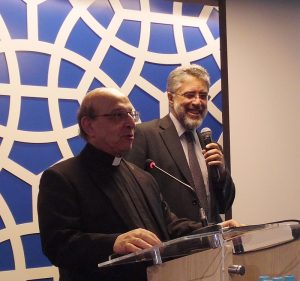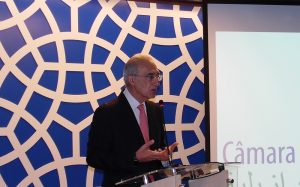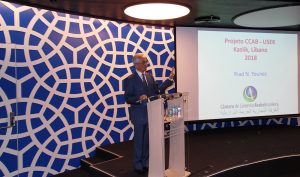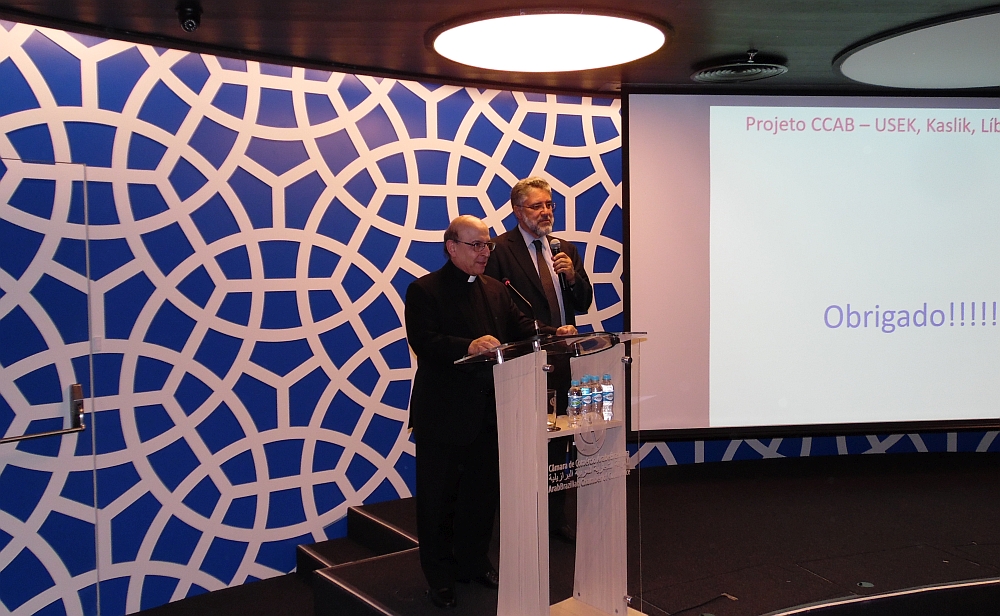São Paulo – The president of the Holy Spirit University of Kaslik (USEK), from Lebanon, priest and professor Georges Hobeika, officially launched this Thursday (03) the Memory Project of the Syrian-Lebanese Immigration in Brazil, at the headquarters of the Arab Brazilian Chamber of Commerce in São Paulo.
The project resulted from a cooperation agreement signed in February by the university and the Arab Chamber and aims to digitize documents that hold the history of the immigration, such as photos, certificates, letters, newspapers and magazines.

“We will gather the documents, dated from the 19th century until today, to retell the memory of the immigration in Latin America,” said Hobeika in his speech. “It would be a crime to allow this memory to fade away,” he added.
USEK has all the infrastructure needed for the digitization and has been doing this type of work for years with documents from Lebanon and has an agreement with families of Syrian and Lebanese origins to preserve the memory of immigration in Argentina. “It’s a continuous work,” the president told ANBA, explaining that other agreements could be signed with other countries after the one with Brazil.
Since it has the equipment and expertise in this sector, USEK will supply the machinery and training for a professional to perform the work in Brazil. The Arab Chamber, in turn, will hire this professional and will be responsible to gather and later return the documents to their owners.
The vice president of Marketing at the Arab Chamber, Riad Younes – who went to Lebanon in February to visit the university and sign the agreement –, added that one of the project’s goal, besides the preservation, is to “create an extensive database with full academic access,” that is, that it can be researched by college students and researchers that are studying the topic. “Many documents are being ruined throughout time,” he said. According to him, Usek has a high tech digitization infrastructure.
Hobeika also said the digitized archive is “a library that can be consulted from a distance.” The project on immigration is an initiative from the USEK’s Latin America Studies and Cultures Center (LASCC), whose director, the Brazilian professor Roberto Khatlab, was also at the event this Thursday. He initiated talks on the subject about two years ago, with the Arab Chamber’s cultural director Sílvia Antibas. Antibas was also in attendance.
Continuous project
Arab Chamber president Rubens Hannun said it is a “great pleasure” to be part of this initiative. “This is a continuous project of the Arab Chamber, over its 65 years of work, to spread Arab culture in Brazil,” he asserted. He also said the partnership with USEK is “extremely important” and has already suggested that it be expanded in the future to encompass all Arab immigration to Brazil.

Hannun noted that Brazil has and still welcomes Arab immigrants well, and that these foreigners and their descendants have contributed greatly to the country’s development. He said it is important to let this be known to Brazilians of all origins. “We are taking a great step for this memory to last into the next generations,” he said.
Along similar lines, Hobeika said Syrian and Lebanese migrants began setting out to the Americas in the late 19th century, at first to escape the Ottoman Empire’s rule, and later to flee other foreign powers. “We have come seeking refuge,” he declared. “We arrived in complete poverty, but through the iron will to accomplish something, we built empires in a number of different fields,” he added. As a case in point, he cited the Syrian-Lebanese Hospital, in São Paulo, which he visited this week, a nationwide cutting-edge healthcare facility.
The president pointed out that Syrian and Lebanese people contributed to the socioeconomic development of the countries they settled in, and he also mentioned the Lebanese-born, United States-based engineer and professor Charles Elachi, who directed NASA’s Jet Propulsion Laboratory (JPL) from 2001 to 2016.
Hobeika also said USEK is a founding member of the League of Arab Universities and that he hopes the Arab diaspora memory digitization project will encourage other Middle East and North Africa countries to do the same.
Music

In introducing the president, Riad Younes said Hobeika has one vocation and three passions. The vocation is priesthood – he is a Maronite priest – and the passions are teaching, research and music. According to him, priest anda professor Hobeika is a scholar at the head of Usek.
To wrap things up, the Lebanese professor gave a sample of one said passion and sang a song he wrote, set to an Eastern rhythm, with Arabic lyrics by Saint Ephrem, the Syrian, a 4th century theologist and poet. One excerpt goes as follows, in a loose translation from Arabic into English: “From one single table, You (God) donate every day to every being everything with absolute Wisdom”.
Over the next few weeks, the Arab Chamber and ANBA will make available the contact information and address for interested parties to submit documents for digitization.
Translated by Sérgio Kakitani & Gabriel Pomerancblum




